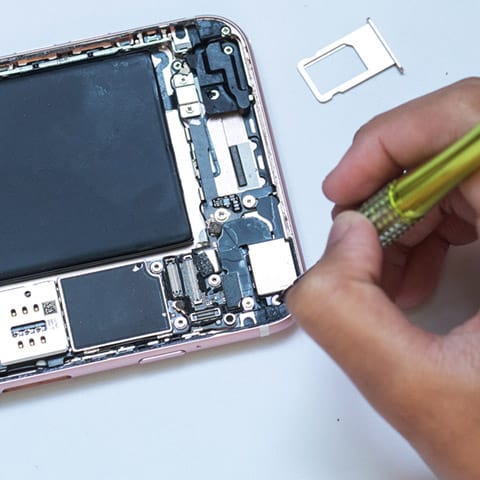5 Best Mid-Range Mobile Phones
Updated Feb 2026
Evolution Of Great Design
Samsung Galaxy S9 may look similar to the S8, but when you peek under the hood you can see all the improvements. The camera is a major leap forward, and the new biometric security features are a welcome addition. Samsung is continuing to prove its flagship phone is the best around.
- Beautifully-designed frame
- Great stereo speakers
- Headphone jack and microSD card slot
- Top-notch biometric security
- Expensive for a mid-range phone
- Samsung still trying to make Bixby work

One Of A Kind For Its Price Range
Xiaomi Mi Mix 2 is an impressive device that cements Xiaomi’s reputation as the leader in bezel-less smartphone design and advanced MIUI interface. This versatile phone is great for every day-to-day use. With an affordable price tag, this device is definitely in the top-tier.
- Beautiful design with ceramic back
- Study Gorilla Glass front,
- 5.9-inch display with no bezel
- excellent for videos and gaming
- LCD and not AMOLED display
- Camera isn’t all that great
- Comes with lots of bloatware
Flagship Performance For A Low, Low Price
This slim smooth offering from HUAWEI will exceed all your expectations. With a full view display on a 5.84-inch full HD screen, an extremely powerful camera and an attractive price tag, it is a solid choice.
- Camera is great for many different uses
- Speedy performance on par with premium phones
- Good value for money
- Weak speakers
- Screen quality isn’t very good
Nokia Is Back In The Game
The powerful Nokia 8, packed with impressive features, a crisp display and potent Snapdragon 835 processor, is an interesting Android flagship. While it may be missing the “wow” factor in the design area, it’s still more than a match for the big players in the category.
- Sharp and detailed display
- Powerful Snapdragon 835 chip
- Solid, sturdy design
- 4GB of RAM so there’s no lag
- Relatively small screen
- Average battery life
- Camera can be finicky
Affordable, Powerful And Fast
Apple purists may say that the iPhone 8 Plus is already outdated, but we say that it is still a really great product with a large 5.5 inch screen, better battery life than its predecessor, and a high performing A11 Bionic chip all wrapped up in a sleek rear glass surface.
- A11 Bionic Chip is cheaper but still fast
- Speedy wireless charging
- Still has the “Home” button
- The most affordable model on this list
- The screen is not OLED
- No Face ID feature
- Not as water resistant as its competitors
- Boring design
How We Decided
Mid-Range Mobile Phones – Our Experts Advise
- Our guide covers the all-important pointers for a great buy that balances your budget with performance.
- Mid-range premium phone:
- The Samsung Galaxy S9 hits all the right notes, with strong performance and high-class features. including Full HD+ resolution, or 2,220 x 1,080 pixels, that is gorgeous. We also love the design – it simply looks and feels good.
- For a really good price:
- The Xiaomi Mi Mix 2 doesn’t feel anything less than a high performer. It has an attractive bezel-less design and performs well both as a phone and as an in-hand gamer. It boasts an octa-core processor, 6GB of RAM and dual 12 and 5-megapixel cameras.
- Impossible to ignore:
- The Apple iPhone 8 Plus has to be amongst our favorite mid-range mobile phones. Yes, this model has been bettered and upgraded in the latest Apple models [INNER LINK HERE], but if you love iOS devices then this nifty phone delivers for a great price.
Mid-Range Smartphone Features
- Operating System-The iPhone 8 Plus uses the iOS operating system; everything else uses Android. Both systems have their fans, and both are continually updated and improved.
- RAM, or Random Access Memory- Often just called “memory”, RAM is measured in gigabytes: 3 GB is good; 4 is better; 6, like the Xiaomi Mi Mix 2 has, is fantastic.
- Storage- Everything in your mobile phone goes here: operating system, apps, software, music, videos — everything. Nowadays, 16GB is obsolete, and 32GB is much more acceptable storage. The best mobile phones now have at least 64GB of storage, but 256GB is tops.
- Battery. Smartphones run on lithium-ion batteries. Capacity is measured in mAh (milliampere hours). All things being equal, more mAh means a longer time before your battery needs a recharge.
- Screen Size- This is not the size of the whole phone, it’s just the size of the display screen. It is measured diagonally, in inches (1 inch = 2.54 cm).
- Resolution- This tells you the number of pixels on your screen – the more pixels, the clearer the image. HD (High Definition) is 1280 x 720; Quad HD is 2560 x 1440.
- Camera- The front camera is (mostly) for selfies, while the rear camera is to take pictures of everything else. They are both measured in megapixels. However, the megapixels don’t matter as much as the aperture. Aperture is measured in f-stops: the focal length divided by the opening size. The smaller the f-stop, the more light can reach the camera’s sensor. For instance, the Samsung Galaxy S9 features a 12MP main camera with an aperture of f/2.4, while Nokia 8 and Huawei Nova 3e comes with an f2.0 aperture which isn’t the brightest.
- Sound Quality- Whether you’re using your phone as a phone, listening to music or watching videos, sound is always an important feature. The Apple iPhone is famous for its high-quality stereo sound.









